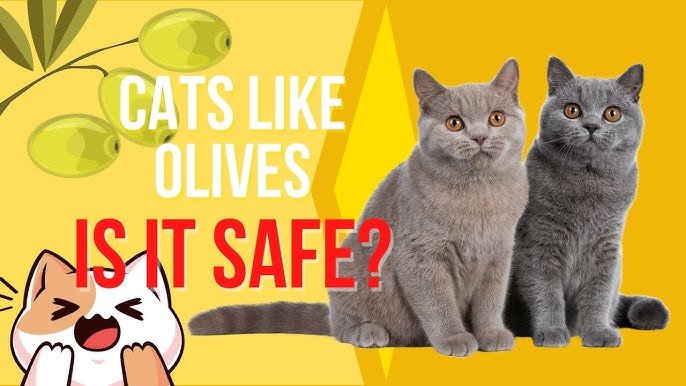Can Cats Eat Olives Safely?
Is It Safe For My Cat To Eat Olives? Whether cats can eat olives is a topic of debate among pet owners and veterinarians. While olives are not considered toxic to cats, they are not an essential part of a feline’s diet, and there are some considerations to keep in mind before offering olives to your cat.
- Nutritional Value: Olives are relatively low in essential nutrients that cats require for optimal health. They are high in fat and sodium, which may not be suitable for all cats, particularly those with dietary restrictions or health issues such as obesity or heart disease.
- Digestive Sensitivity: Cats have sensitive digestive systems, and introducing new foods into their diet can sometimes lead to gastrointestinal upset, including vomiting or diarrhea. Olives are acidic and may cause stomach discomfort or digestive disturbances in some cats.
- Taste Preferences: Cats are obligate carnivores, meaning their diet should primarily consist of animal-based protein. While some cats may be curious about olives and may nibble on them out of curiosity, others may find the taste unappealing and may not show interest in eating them.
- Potential Choking Hazard: The pits or seeds found in some olives could pose a choking hazard to cats if swallowed whole. Additionally, the size and shape of olives may be challenging for cats to chew and could lead to choking or gastrointestinal obstruction.
Given these considerations, it’s generally best to avoid feeding olives to cats as a regular part of their diet. Instead, focus on providing them with a balanced and species-appropriate diet consisting of high-quality cat food formulated to meet their nutritional needs. If you’re unsure about whether olives are safe for your cat, it’s always best to consult with your veterinarian for personalized advice based on your cat’s health status and dietary requirements.
Health Implications of Feeding Olives to Cats
Feeding olives to cats can have various health implications, and while olives are not toxic to cats, they may not be the most suitable or beneficial food for feline consumption. Here are some potential health implications to consider:
- Digestive Upset: Cats have sensitive digestive systems, and introducing new foods like olives into their diet can sometimes lead to gastrointestinal upset. Olives are acidic and may cause stomach discomfort, vomiting, or diarrhea in some cats, particularly those with sensitive stomachs or digestive issues.
- High-Fat Content: Olives are relatively high in fat, which is not a primary nutrient in a cat’s diet. Feeding olives regularly could contribute to weight gain and obesity, especially if your cat consumes them in large quantities.
- Sodium Intake: Olives are often brined or marinated in salt water, resulting in a high sodium content. Excessive sodium intake can lead to health problems such as hypertension (high blood pressure) and kidney disease in cats, especially those predisposed to these conditions.
- Lack of Essential Nutrients: While olives contain some beneficial nutrients like antioxidants and healthy fats, they do not provide essential nutrients that cats need for optimal health, such as taurine, an amino acid found in animal-based proteins. Feeding olives as a primary food source could lead to nutritional deficiencies over time.
- Choking Hazard: The pits or seeds found in some olives could pose a choking hazard to cats if swallowed whole. Additionally, the size and shape of olives may be challenging for cats to chew and could lead to choking or gastrointestinal obstruction.
Overall, while offering a small piece of olive occasionally as a treat is unlikely to cause harm to most cats, it’s essential to do so in moderation and be mindful of potential health implications. It’s best to prioritize feeding your cat a balanced and species-appropriate diet consisting of high-quality cat food formulated to meet their nutritional needs. If you have any concerns about feeding olives or other human foods to your cat, consult with your veterinarian for personalized advice and recommendations.

